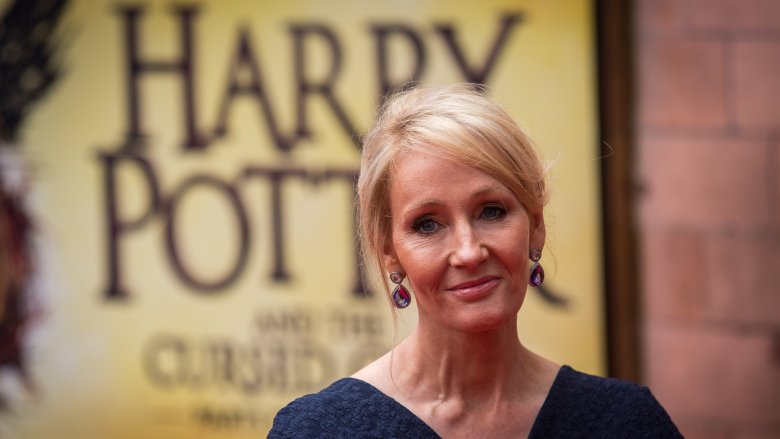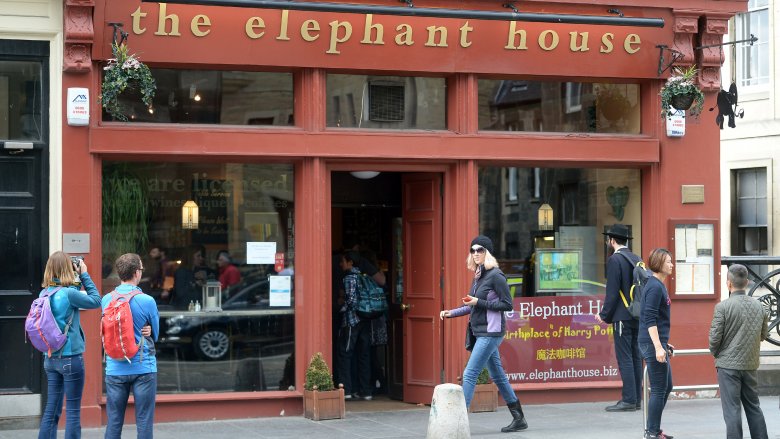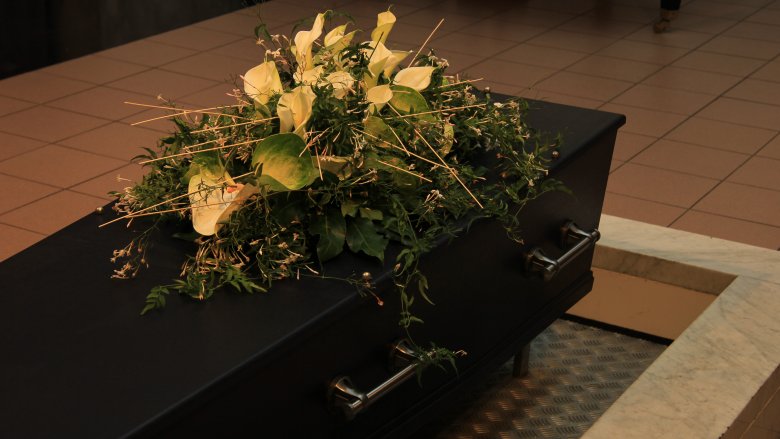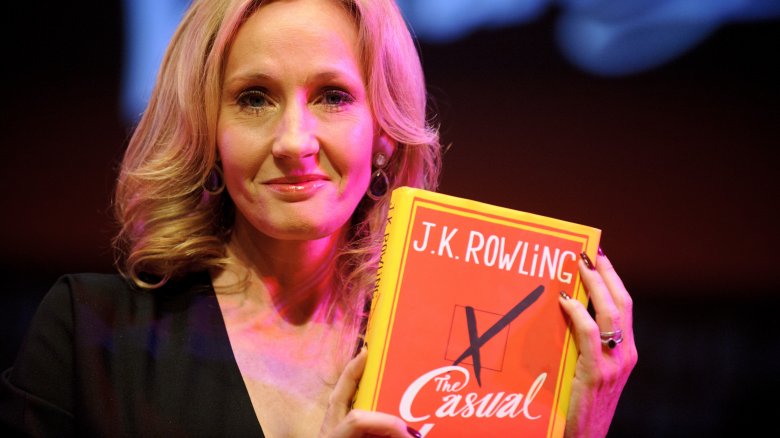How J.K. Rowling Went From Welfare To Wizarding Wonder
We may receive a commission on purchases made from links.
The story of J.K. Rowling's rise to literary fame and fortune has been well-documented, but most people only know the broad strokes. Like that she was a struggling writer with a big imagination, and when the Harry Potter manuscript finally sold, her life was never the same. But there have been many events in Joanne Rowling's life that have contributed to her journey. Looking more closely at these tricky times in her life, Rowling's resilient nature truly emerges. She was able to take each personal experience and draw inspiration from it instead of succumbing to the negative feelings that attacked her self-worth. It's easy to attribute luck to those who become ridiculously successful, and sure, there might be an ounce of that here. Mostly, however, Rowling became a published author and prominent figure due to her persistence. There's nothing magical about hard work.
She had a rocky and short-lived marriage in a foreign country
As many young people do, Rowling traveled overseas in her mid-20s to get a taste of living abroad. She chose Portugal because she could teach English as a foreign language and still enjoy a flexible schedule that allowed her to write and explore. She soon began a relationship with Jorge Arantes, who was 23 years old and trying to crack the journalism world. They bonded over their love of books and writing, and married in 1992. Their daughter Jessica was born in 1993, but the marriage didn't last. In fact, it ended that year. Rowling moved back to the U.K., not to London where she had previously worked a series of odd jobs, but to Scotland where her sister lived. She was a single mom with no real job prospects.
What she did have, though, was the first few chapters of Harry Potter. The story idea had already been conceived, and she'd started to carefully map out the major plot points in any spare moment her schedule allowed. This is someone who knew she wanted to write novels from an early age, so she was thinking big. There would be seven books in the series. They would follow a boy who came from humble beginnings, but would turn out to live an extraordinary life filled with wonder and danger. Over the next few years, Rowling focused much of her energy on writing the first book.
She worked as a typist at Edinburgh Church
Before Rowling had the luxury of writing in a comfortable office setting and in her own time, she was forced to spend a lot of time not writing. Because even though she had a book to complete that could potentially improve her living situation, she obviously had to earn money in the meantime to support herself and her daughter. She soon picked up clerical work such as typing and filing at her local church in Edinburgh. She couldn't afford child care at the time, so she explained her situation to the minister and was granted permission to take Jessica to work with her. If all went well, Jessica would simply sleep in her stroller for the duration of Rowling's shift. The money that Rowling earned during this period was inconsequential, just a few pounds to keep her from losing government benefits.
With the Gingerbread charity that Rowling now spearheads, she has spoken frequently about the "single mom" stigma. Recalling this pre-Harry Potter part of her life, she remembers being categorized as a "single mom on benefits" and how demeaning that was. In those years, people didn't talk about these issues or seek help, which only perpetuated feelings of hopelessness. Rowling's current mission is to encourage single parents to be open with their needs.
Despite dire circumstances, she focused her spare time on writing
When she wasn't working for meager pay, Rowling concentrated on writing Harry Potter. It sounds obvious, but it can be difficult to focus on the end goal when paychecks are scarce. Stress levels increase when stakes are high. However, Rowling recognized early on that she possessed the ideal personality to be a writer. "As soon as I knew what writers were, I wanted to be one," she wrote on her website. "I've got the perfect temperament of a writer; perfectly happy along in a room, making things up." Knowing and understanding that quality, she worked to make that a reality.
And what did that involve? Mostly being a frequent customer at The Elephant House in Edinburgh, where she would sit in the back room and try to remain there all day despite ordering only one cup of coffee. Rowling didn't have many resources, but she used what was available to her.
Six months after starting Harry Potter, her mother died
At the time of her mother's death from multiple sclerosis complications at age 45, Rowling was 25 years old. She received the dreaded call from her father early one morning, and after tracing the timeline of the previous day, realized she had been writing Harry Potter when her mother passed away. Apart from the obvious trauma of losing a parent at a young age, Rowling regrets that her mother never knew she was writing Harry Potter. She knew of her writing ambitions, obviously, but Rowling hadn't shared this particular story idea with her.
In an interview with The Telegraph, Rowling said she thinks of her mother every day because "there would be so much to tell her, impossibly much." The loss of her mother prompted Rowling to integrate the theme of death into Harry Potter. Not only does Harry lose his parents, but Voldemort chases immortality. Most people fear death on some level, and understandably it was a feeling that troubled and consumed Rowling, while also providing a natural depth to her work.
She experienced deep depression and considered suicide
During the most trying times in her life, Rowling suffered from depression. She was young, had already endured a failed marriage, and was barely earning enough money to support herself and her daughter. In Britain's Sunday Times newspaper, Rowling shared that she even considered killing herself. But it was her daughter Jessica who pulled her away from those terrifying thoughts. She acknowledged that Jessica couldn't grow up with a mother in such a dangerous state of mind, so she sought professional counseling to learn how to maintain her productivity and get back on track.
Since becoming a public figure, Rowling has spoken about her depression and emphasized that she never felt ashamed. "What's to be ashamed of? I went through a really rough time and I am quite proud that I got out of that," she told a student magazine at Edinburgh University. Her perspective is refreshing; as with single parenting, there remains a stigma associated with depression. There's really not much difference between seeking medical assistance for a broken arm and seeking help for mental issues, yet the latter is often viewed as a weakness. In Rowling's post-Harry Potter life, she's never been hesitant to speak about her struggles and encourages others to do the same.
Harry Potter was rejected from numerous publishers
With her manuscript for Harry Potter and the Philosopher's Stone completed and ready to be scrutinized, Rowling submitted it to literary agents. This was a tricky task in and of itself because Rowling could barely afford the envelopes to slip the pages into. If an agent didn't send it back to her, she was forced to scramble around for another one. But the worst part was that rejection letters started to flow in. This could have easily been the end of Joanne Rowling, but she'd worked too hard and sacrificed too much for this writing venture not to work out.
She kept sending query letters to agents, hoping they'd ask to see more of the manuscript. Ultimately, Rowling kept on pushing because she knew her story was something that children could relate to. In a video interview at The Elephant House, Rowling described Harry Potter as a very traditional story: "You have several classic elements, as in a small child who's got powers that no other child has — I think that's a very common fantasy for children. He comes from a very horrible background, and he escapes, and I think, again, that's a perennial fantasy, being able to go to a place where there isn't that much adult control." Rowling probably didn't anticipate that adults would enjoy her interpretation of escapism with the same eagerness as children.
It's also interesting to note that since Harry Potter, Rowling has been rejected. She penned a thriller novel under the pseudonym Robert Galbraith and received numerous rejections from publishers. She was even advised to take a writing course.
She didn't have the tools to deal with failure
Failure is another topic people find difficult to talk about, and that's understandable. Like death, it's something that we don't have much control over. When Rowling was living in poverty, she felt like she was a failure. There are many unknowns with writing, and she wasn't equipped to handle the pressure. Since achieving recognition for her work, Rowling has spoken about failure in very real terms. In her Harvard University Commencement Speech, she described the negative feelings she grappled with for so long before she experienced any success. "An exceptionally short marriage had imploded, and I was jobless, a lone parent, and as poor as it is possible to be in modern Britain, without being homeless. The fears that my parents had had for me, and that I had had for myself, had both come to pass, and by every usual standard, I was the biggest failure I knew." She then encouraged the graduating students not to fear failure no matter their circumstances, because it can reveal the qualities we value most in life. In Rowling's case, it's courage.
In an interview with Matt Lauer on NBC's The Today Show, Rowling described a piece of advice that would have helped her during those years of struggle: "It would have really helped to have someone who had some measure of success come say to me, 'you will fail. That's inevitable. It's what you do with it.'" In receiving her multitude of rejection letters, Rowling was presented with the prospect of failure. But she was not prepared to fail.
Harry Potter sold to Bloomsbury, but Rowling was advised to get a day job
Finally, Rowling's manuscript of Harry Potter became noticed by someone important in the literary field. Christopher Little from Bloomsbury, which at the time was a small operation, accepted it for publication. Rowling was told not to expect too much money from book sales, as children's literature is rarely a goldmine — especially for unknown authors. Her editor even advised her to get a day job because he didn't anticipate she would make enough money to sustain herself. She didn't follow his advice, continuing to muddle through as she had been doing before. The editorial team also advised her not to publish under her name, as female authors weren't usually popular with young boys, who were the target audience of the book. So, Joanne was dropped to "J," and the "K" came from her grandmother's name, Kathleen. (Joanne doesn't have a middle name on her birth certificate.) Thus, J.K. Rowling was born.
Not only did J.K. Rowling's Harry Potter go on to be published in the U.K. and become an instant bestseller, but it quickly made its way around the world. The book was translated into multiple languages, and Rowling did not have to get a day job.
Even after receiving large paychecks, she continues to write with the same urgency
This is what's really interesting about Rowling. The Harry Potter series became a bestseller all over the world, and it was adapted into a hugely successful film series that launched the careers of many young actors. There are Harry Potter-themed amusement park rides. Butterbeer actually exists. That amount of success — and obviously, millions of dollars into Rowling's pocket — would be enough to send many in the wrong direction. At the very least, most people would retire and live a life of luxury. But it doesn't seem Rowling has let it go to her head, and the Harry Potter books never suffered in quality. When they were completed, she didn't retire. Despite achieving the highest acclaim one can possibly achieve in her field, she kept on writing.
Rowling's first novel intended for adults, The Casual Vacancy, was published in 2012. It received mixed reviews. Then came a series of crime books under the name Robert Galbraith. Rowling has written or been involved in various supplements to the Harry Potter series. She's maintained a busy work schedule since becoming as famous as (and richer than) The Queen. It's clear that Rowling genuinely enjoys writing, and she's continuing even though the best of her days may be behind her. There's a lot to be said for that.
As an accomplished author, she gives back to single moms
As the most well-known children's author in modern memory, Rowling has not forgotten where she came from. These days, along with writing efforts, she supports the Gingerbread charity as its president. It's a resource for single parents in the U.K., where they can receive advice on their personal situation, meet other single parents, receive training in order to gain better employment, and campaign for additional programs to support themselves and their children. Rowling regularly shares her varied experiences with Gingerbread, and stated in a post on the website that she's most proud of her years as a single mother. "Yes, I got off benefits and wrote the first four Harry Potter books as a single mother, but nothing makes me prouder than what Jessica told me recently about the first five years of her life. 'I never knew we were poor. I just remember being happy.'" Quite apart from her literary success, the fact that Rowling was able to pull through during the early years and give her daughter an enriching childhood is a notable achievement.
If there's a will, there's a way. Rowling possessed a fierce determination to get where she is, and she's continuing to work diligently toward new goals. The idea of being a doer — even when it seemed like success was seriously unlikely — is absolutely the key element in her story.










